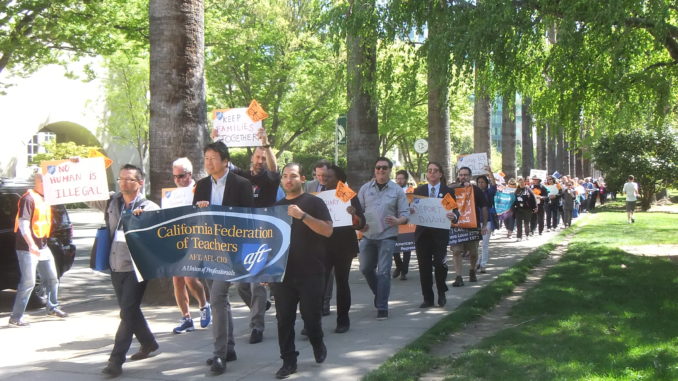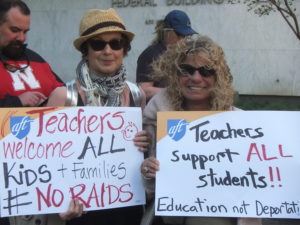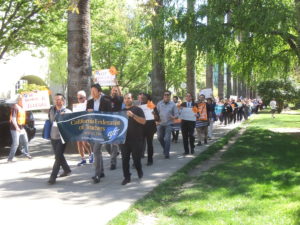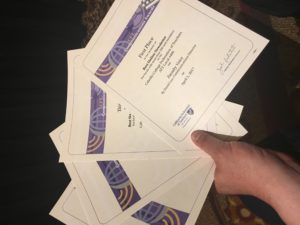
The California Federation of Teachers annual convention took place this year in the sharp contradictions of downtown Sacramento. The walk between small numbers of upscale restaurants in the hotel district was crowded with destitute people. The corporate hotel confines featured a great Union Hall banner. Indeed, a diverse working membership, whose organization has substantial clout in Sactown, focused on political major issues this year, including the protection of immigrants and their communities, climate change, and the need for equity in society for African American men. These issues and topics like pensions, the adjunct reforms in Assembly Bill 1379, and new organizing strategies indicated a union shaping a many-sided coalition against the backward and punitive policies of the Trump administration. Friday kicked off with a march in support of the Immigrant’s Rights Movement.
When I arrived in Sacramento on Friday I went to “Labor History and Resistance in the Time of Trump,” a workshop led by CFT Communications Director and City College San Francisco Instructor Fred Glass. Fred was developing his account of the conservative and right-wing opposition to unions while also referring to episodes of labor resistance from California’s past. A historian, he has recently published From Mission to Microchip, a history from below of the laboring and working communities in our state from the 18th century to the present. Discussion among participants was radical and spirited. CFT is among the most political unions; there was discussion of developing a positive socialist program. Indeed, some convention resolutions could work as a model. Other workshops included the looming changes to agency fee once Trump has appointed a right-wing justice like Neil Gorsuch. The new Supreme Court case to watch for is AFSCME v. Janus. There were also workshops on the looming fight over public sector pensions, legal challenges to political protest, the many faces of fascism, and building bridges between UC adjuncts and those at the community colleges.
Next I attended a committee session on socio-political resolutions for the convention. Many were striking in their tone and rigor. There were resolutions in support of Native American populations in resource extraction areas: one of these called on the Federal Government to honor treaties; the other dealt with the well-known struggle against the Dakota Access Pipeline. There were many others: reform of solitary confinement, support for a new bottom up organizing model in CFT, defending academic freedom. Yet another called for the formation of a state-wide response team for dealing with Trump’s new harsh enforcement of immigration laws. Direct action was on the table.
 The Community College Council meeting on Friday began with a presentation from the system’s Vice-Chancellor of Finance and Facilities, Mario Rodriguez, an appointee of Governor Brown. He gave a presentation on how CFT can have effective influence on budget priorities and eventual policies, emphasizing the need for locals to come to Sacramento. Though a tad wonky, he was also honest and relatively straightforward, even saying on several occasions that Governor Brown has not been the best advocate for Community College system priorities. CCFT council member Susan Stuart pressed him hard on the question of repeatability in a charged moment on the question of priorities.
The Community College Council meeting on Friday began with a presentation from the system’s Vice-Chancellor of Finance and Facilities, Mario Rodriguez, an appointee of Governor Brown. He gave a presentation on how CFT can have effective influence on budget priorities and eventual policies, emphasizing the need for locals to come to Sacramento. Though a tad wonky, he was also honest and relatively straightforward, even saying on several occasions that Governor Brown has not been the best advocate for Community College system priorities. CCFT council member Susan Stuart pressed him hard on the question of repeatability in a charged moment on the question of priorities.
The Vice-Chancellor was followed by the new interim-director of the rogue accreditor ACCJC, by now infamous for its profoundly injurious policies of sanctions and accreditation stripping. CFT has fought the accreditor most visibly in the successful defense of City College San Francisco, which ACCJC would have seen close. Not only did CCSF stay open, the ACCJC was itself nearly dissolved as an accreditor for its flagrant violations of Federal law. That near-death experience was reflected in a much-chastened interim leader’s presence before us on Friday.
While interim director Dr. Richard Winn tried to strike the right tone, emphasizing the fundamental lack of trust between ACCJC and the union, his whole routine was too little too late. In fact, CFT members grilled him for hours regarding the destructive, unruly, and inconsistent behavior of the ACCJC. When he spoke to the two emphases of the commission, I heard no new tune. He quickly named learning outcomes and institutional stability, euphemisms for student loan company pedagogy and ACCJC interference in autonomous budget and collective bargaining processes.
Saturday’s headline speakers began with Tony Thurmond, a California Assembly member from Richmond. He was a very effective with the CFT crowd. As he intoned the convention slogan “organize and resist” he put one fist and then another in the air. His personal background, too, was compelling for the union hall. He grew up in a poor San Jose home, with his single-mother dead from cancer by the time he was six. For him, his teachers were everything. He later went into social work and finally politics, first on the Richmond City Council and later on its beleaguered school board. He described being sworn in on the board and being forced that very night to vote to close ten Richmond schools. He voted no and then worked to find stop-gap funds to keep 4 of the ten schools open in the arduous days of the financial crisis. I was struck by his positive sense of political will. He mentioned Proposition 13, once thought to be the unsayable of California politics, and the need for the wealthy and corporations to pay their share of property taxes. Thurmond is an announced candidate for California Education Secretary, so it was noticeable that there was no criticism of charter schools in his speech. What does he think of Proposition 39, which mandated district funds for charters and created the monster in the first place? Does he support the CFT-sponsored legislation on charter school accountability or other reforms?
Tom Steyer, the billionaire environmentalist and progressive activist, was the other headliner. The crowd of workers received him coolly, but eventually he had a strong response from the audience in the room. He sounded like a man on a political mission; he was tough on the Trump cabinet, starting with Betsy DeVos, the billionaire Amway heiress and Education Secretary; he voiced strong support for education and for workers in our sector (his mother and grandmother were teachers); and he was very solid on the environment. It seemed this political neophyte might be seeking office.
Joshua Pechthalt, the current CFT President, was all but assured re-election at the convention, having led the successful passage of both propositions 30 and 55, bolstering state funding for our public schools. As CFT President, he was a strong advocate for Sanders campaign, bucking the national AFT endorsement of Clinton. His politics are well to the left of the mainstream. Yet in a sign of the times, Pechthalt himself was facing a candidate to his own left in the Presidential election. Berkeley teacher and well-known Bay Area activist Yvette Falarca spoke before the convention hall of the need for “no business as usual” while Donald Trump is President. She called for the transformation of the union into a force in direct action protests across the state. In a word, her slogan was “resistance by any means necessary.” While she had plenty of applause in the room, it was also clear she had not built any sizeable network of support within the union itself. Per convention resolution, the current CFT leadership is supporting Alliance to Reclaim our Schools (AROS) as an organizing network for May Day demonstrations and beyond. “Resistance” and “fascism” appeared in many places in convention materials. So why not turn some political fire onto charter schools, their big backers, and the politicians who benefit from charter contributions. Charters are an extreme development of the logic of privatization of public goods. Further, they are the means by which the interests of capital carry out the root and branch destruction of traditional public education. Administrators and charter operators profit from this arrangement.
 CCFT also had a productive lunch meeting with City College San Francisco delegates about CCFT’s work around repeatability restrictions. CCSF faculty and union activists are fresh off their victory against ACCJC and will be turning now to work on new issues. They were feted at the convention hotel on Saturday. Our local 4400 was honored during the Communications Awards ceremony. We received the award for best online newsletter for the second year in a row. I also took second in the best editorial category. In addition we took second in best print newsletter more than six pages and 3rd in best website. CCSF and other locals’ bottom-up activist commitment is what we need to fight Trump, the snarling face of the privatization movement. Locals will need to push leadership even further and at all levels—from the page to streets and the legislature—in this new political context.
CCFT also had a productive lunch meeting with City College San Francisco delegates about CCFT’s work around repeatability restrictions. CCSF faculty and union activists are fresh off their victory against ACCJC and will be turning now to work on new issues. They were feted at the convention hotel on Saturday. Our local 4400 was honored during the Communications Awards ceremony. We received the award for best online newsletter for the second year in a row. I also took second in the best editorial category. In addition we took second in best print newsletter more than six pages and 3rd in best website. CCSF and other locals’ bottom-up activist commitment is what we need to fight Trump, the snarling face of the privatization movement. Locals will need to push leadership even further and at all levels—from the page to streets and the legislature—in this new political context.

